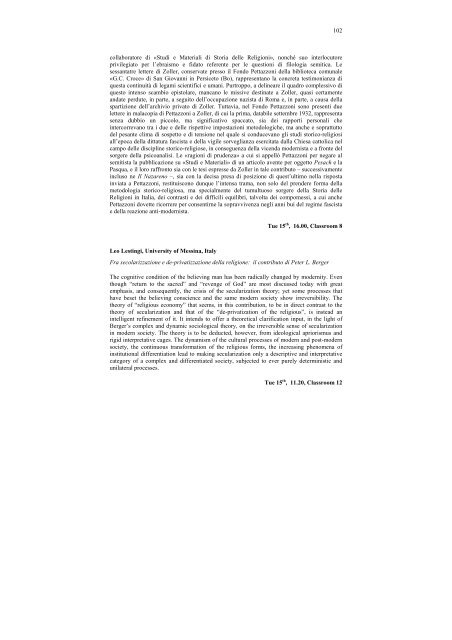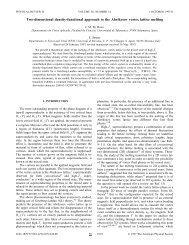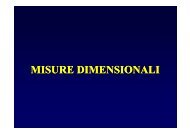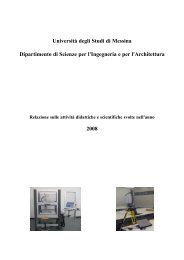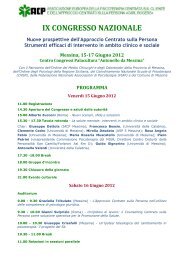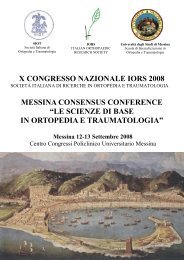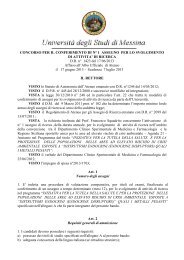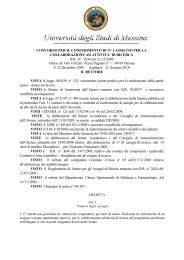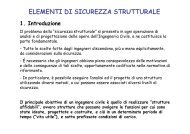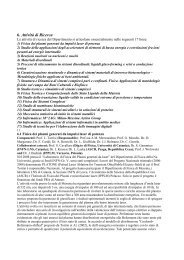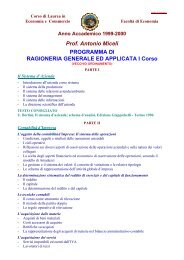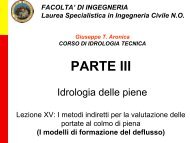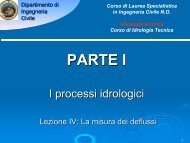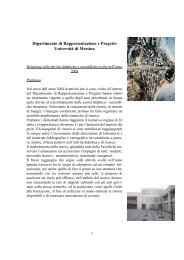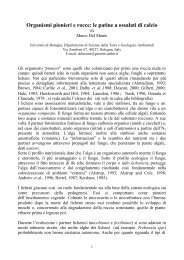PROGRAMME AND ABSTRACTS - Università degli Studi di Messina
PROGRAMME AND ABSTRACTS - Università degli Studi di Messina
PROGRAMME AND ABSTRACTS - Università degli Studi di Messina
You also want an ePaper? Increase the reach of your titles
YUMPU automatically turns print PDFs into web optimized ePapers that Google loves.
102<br />
collaboratore <strong>di</strong> «<strong>Stu<strong>di</strong></strong> e Materiali <strong>di</strong> Storia delle Religioni», nonché suo interlocutore<br />
privilegiato per l’ebraismo e fidato referente per le questioni <strong>di</strong> filologia semitica. Le<br />
sessantatre lettere <strong>di</strong> Zoller, conservate presso il Fondo Pettazzoni della biblioteca comunale<br />
«G.C. Croce» <strong>di</strong> San Giovanni in Persiceto (Bo), rappresentano la concreta testimonianza <strong>di</strong><br />
questa continuità <strong>di</strong> legami scientifici e umani. Purtroppo, a delineare il quadro complessivo <strong>di</strong><br />
questo intenso scambio epistolare, mancano le missive destinate a Zoller, quasi certamente<br />
andate perdute, in parte, a seguito dell’occupazione nazista <strong>di</strong> Roma e, in parte, a causa della<br />
spartizione dell’archivio privato <strong>di</strong> Zoller. Tuttavia, nel Fondo Pettazzoni sono presenti due<br />
lettere in malacopia <strong>di</strong> Pettazzoni a Zoller, <strong>di</strong> cui la prima, databile settembre 1932, rappresenta<br />
senza dubbio un piccolo, ma significativo spaccato, sia dei rapporti personali che<br />
intercorrevano tra i due e delle rispettive impostazioni metodologiche, ma anche e soprattutto<br />
del pesante clima <strong>di</strong> sospetto e <strong>di</strong> tensione nel quale si conducevano gli stu<strong>di</strong> storico-religiosi<br />
all’epoca della <strong>di</strong>ttatura fascista e della vigile sorveglianza esercitata dalla Chiesa cattolica nel<br />
campo delle <strong>di</strong>scipline storico-religiose, in conseguenza della vicenda modernista e a fronte del<br />
sorgere della psicoanalisi. Le «ragioni <strong>di</strong> prudenza» a cui si appellò Pettazzoni per negare al<br />
semitista la pubblicazione su «<strong>Stu<strong>di</strong></strong> e Materiali» <strong>di</strong> un articolo avente per oggetto Pesach e la<br />
Pasqua, e il loro raffronto sia con le tesi espresse da Zoller in tale contributo – successivamente<br />
incluso ne Il Nazareno –, sia con la decisa presa <strong>di</strong> posizione <strong>di</strong> quest’ultimo nella risposta<br />
inviata a Pettazzoni, restituiscono dunque l’intensa trama, non solo del prendere forma della<br />
metodologia storico-religiosa, ma specialmente del tumultuoso sorgere della Storia delle<br />
Religioni in Italia, dei contrasti e dei <strong>di</strong>fficili equilibri, talvolta dei compomessi, a cui anche<br />
Pettazzoni dovette ricorrere per consentirne la sopravvivenza negli anni bui del regime fascista<br />
e della reazione anti-modernista.<br />
Leo Lestingi, University of <strong>Messina</strong>, Italy<br />
Tue 15 th , 16.00, Classroom 8<br />
Fra secolarizzazione e de-privatizzazione della religione: il contributo <strong>di</strong> Peter L. Berger<br />
The cognitive con<strong>di</strong>tion of the believing man has been ra<strong>di</strong>cally changed by modernity. Even<br />
though “return to the sacred” and “revenge of God” are most <strong>di</strong>scussed today with great<br />
emphasis, and consequently, the crisis of the secularization theory; yet some processes that<br />
have beset the believing conscience and the same modern society show irreversibility. The<br />
theory of “religious economy” that seems, in this contribution, to be in <strong>di</strong>rect contrast to the<br />
theory of secularization and that of the “de-privatization of the religious”, is instead an<br />
intelligent refinement of it. It intends to offer a theoretical clarification input, in the light of<br />
Berger’s complex and dynamic sociological theory, on the irreversible sense of secularization<br />
in modern society. The theory is to be deducted, however, from ideological apriorismus and<br />
rigid interpretative cages. The dynamism of the cultural processes of modern and post-modern<br />
society, the continuous transformation of the religious forms, the increasing phenomena of<br />
institutional <strong>di</strong>fferentiation lead to making secularization only a descriptive and interpretative<br />
category of a complex and <strong>di</strong>fferentiated society, subjected to ever purely deterministic and<br />
unilateral processes.<br />
Tue 15 th , 11.20, Classroom 12


